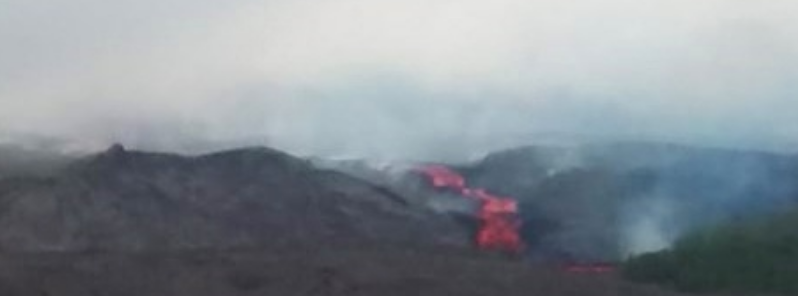Fifth eruption of the year at Piton de la Fournaise, Reunion

The Piton de la Fournaise volcano erupted on October 25, 2019, for the fifth time this year. According to OVPF, the tremor corresponding with the arrival of the lava near the surface was recorded since 04:15 LT.
The low lava flow front is over the Piton Tremblet, at an altitude of about 600 m (1 968 feet) and less than 2 500 m (8 202 feet) from the Route Nationale 2 (RN2) but lava could reach it by the evening.
The Prefect has decided to implement the alert phase 2-2- "eruption in progress in the enclosure."
The public has been advised not to go near and within the area in the Fourque enclosure, from the Pas de Bellecombe trail or from any other path. Aircraft landing in the volcano area is also strictly prohibited until further notice.
Due to its quick progression in the Great Slopes, a screening of the RN2 by the police is underway.
"The eruptive fissures are located in the South / Southeast sector, at the level of the Great Slopes, upstream of Piton Tremblet. The lava front is currently about 2.5 km (1.5 miles) from the road," said the Volcanological Observatory of Piton de la Fournaise in a tweet.
Geological summary
The massive Piton de la Fournaise basaltic shield volcano on the French island of Réunion in the western Indian Ocean is one of the world's most active volcanoes. Much of its more than 530 000-year history overlapped with eruptions of the deeply dissected Piton des Neiges shield volcano to the NW.
Three calderas formed at about 250 000, 65 000, and less than 5 000 years ago by progressive eastward slumping of the volcano. Numerous pyroclastic cones dot the floor of the calderas and their outer flanks.
Most historical eruptions have originated from the summit and flanks of Dolomieu, a 400-m-high (1 312 feet) lava shield that has grown within the youngest caldera, which is 8 km (26 247 feet) wide and breached to below sea level on the eastern side. More than 150 eruptions, most of which have produced fluid basaltic lava flows, have occurred since the 17th century.
Only six eruptions, in 1708, 1774, 1776, 1800, 1977, and 1986, have originated from fissures on the outer flanks of the caldera. The Piton de la Fournaise Volcano Observatory, one of several operated by the Institut de Physique du Globe de Paris (IPGP), monitors this very active volcano. (GVP)
Featured image credit: OVPF

Commenting rules and guidelines
We value the thoughts and opinions of our readers and welcome healthy discussions on our website. In order to maintain a respectful and positive community, we ask that all commenters follow these rules:
We reserve the right to remove any comments that violate these rules. By commenting on our website, you agree to abide by these guidelines. Thank you for helping to create a positive and welcoming environment for all.